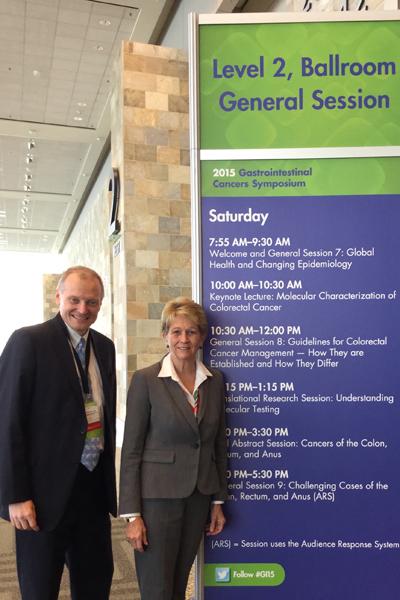
Carolyn Aldigé is the President and Founder of the Prevent Cancer Foundation. Its mission is saving lives through cancer prevention and early detection.
As President and Founder of the Prevent Cancer Foundation, it is imperative for me to keep abreast of the latest research in prevention and early detection. Because we are often contacted by newly-diagnosed GI cancer patients, it is also vital that I keep up with progress in the development of therapies. So although I’m invited to numerous meetings, I couldn’t pass up the opportunity to attend the 2015 GI Cancers Symposium.
Out of this wealth of information, the talks and sessions I found particularly informative and relevant included:
Viral Hepatitis in the Oncology Landscape. The landscape is vastly different for hepatocellular carcinoma (HCC). There are now effective treatments for both hepatitis B and hepatitis C that can cure these two diseases, which often developed into HCC. There is also a vaccine against hepatitis B and screening for hepatitis C. These advances have made HCC a preventable disease.
Global Health and Changing Epidemiology. This general session was particularly relevant to prevention. All three talks were excellent, but I was particularly interested in Dr. Elena Martinez’s talk on the changing epidemiology of colorectal cancer. (Dr. Martinez was funded by Prevent Cancer as a junior investigator.)
Guidelines for Colorectal Cancer Management. It is not easy for the layperson to understand the nuances of variation among the guidelines from the National Comprehensive Cancer Network (NCCN), National Institute for Health and Care Excellence (NICE), and European Society for Medical Oncology (ESMO). The speakers provided great detail about the processes and procedures each organization uses to arrive at a consensus and more detail about updates to guidelines.
There were many other highlights, but one of the most meaningful opportunities at the symposium was interacting with fellow advocates from the GI cancer community.  A dinner the first evening, hosted by the Otto J. Ruesch Center at the Georgetown Lombardi Comprehensive Cancer Center, provided valuable networking opportunities, along with formal presentations and informal discussions about advocates working collaboratively to advance a shared agenda.
A dinner the first evening, hosted by the Otto J. Ruesch Center at the Georgetown Lombardi Comprehensive Cancer Center, provided valuable networking opportunities, along with formal presentations and informal discussions about advocates working collaboratively to advance a shared agenda.
Dr. John Marshall, Clinical Director of Oncology for Georgetown University Hospital, Associate Director for Clinical Care of the Lombardi Comprehensive Cancer Center, and Director of the Otto J. Ruesch Center for the Cure of Gastrointestinal Cancer, honored me by inviting me to speak about the Prevent Cancer Foundation’s advocacy activities, as well as lead an after-dinner discussion about opportunities for advocacy groups to partner with each other and with the Ruesch Center, and ways the Ruesch Center can support advocacy efforts.
The discussion was lively, interesting, and ultimately—I believe—productive. Many new advocates participated and benefitted from the perspectives of colleagues who have been working in advocacy for many years.
Overall, the GI Symposium provided a profoundly meaningful opportunity for learning—from the scientific presentations, from interactions with ASCO members, and from other advocates.
